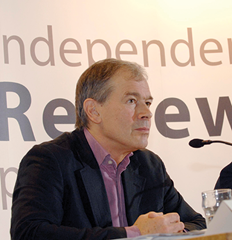We’re not all in it together
 Cutting benefits will widen the gap between rich and poor in Northern Ireland with major consequences for social stability,
Cutting benefits will widen the gap between rich and poor in Northern Ireland with major consequences for social stability,
Paddy Hillyard contends in his critique of welfare reform.
Working class women and young people will be most affected.
Protests and riots have dominated the news in recent weeks, eclipsing the major reforms to the welfare state both here and at Westminster. Yet the impact of the latter will be profound and perhaps will pose an even bigger challenge to social order in the future.
All the reforms are taking place against a backdrop of increasing inequality. The top 10 per cent in the United Kingdom own 100 times more wealth than the bottom 10 per cent. The top 1 per cent now take home 15 per cent of the total income compared with a figure of 6 per cent in 1979.
Over the same period, the proportion of the GDP going on wages dropped from 59 per cent of GDP to 53 per cent, unemployment benefit declined from 22 per cent of the average wage to 11 per cent, and the proportion of low paid jobs has doubled to 21 per cent. Work has become precarious and few can expect the same job for life.
The reforms are being driven through by divisive political rhetoric such as ‘the strivers versus the skivers’, dishonest sound-bites that ‘we are all it in together’, the abuse and misuse of statistics, and above all, the denigration of public provision and social solidarity.
The reforms include the continuing privatisation of a range of health and public services and extensive reforms of social security. The Welfare Reform Bill currently at committee stage in Northern Ireland will, among other things, replace disability living allowance by a much more limited personal independence payment, reduce housing benefit and introduce punitive measures for job-seekers.
The Social Development Minister, Nelson McCausland, in moving the second stage of the Bill gave no data on which households will be most affected by these changes. He also failed to analyse the specific characteristics of Northern Ireland: the high rate of under-employment, the larger family size, the lack of a statutory child care system, the unique housing characteristics, and a legacy of violent conflict leaving thousands physically and psychologically damaged, and how these will affect the proposed changes. Although the Executive has a legal duty to eradicate child poverty, no figures were produced on the impact of these changes on child poverty.
At the beginning of January, the Coalition Government passed the Welfare Reform Up-rating Bill. A range of benefits will be increased by less than inflation over the next three years. Figures produced by the Institute for Fiscal Studies suggest that workless households will lose £215 per year and those in work will see their entitlements reduced, on average, by £165 per year. The UK Women’s Budget Group has estimated that these changes will affect women most, with female lone parents losing 2.4 per cent of their weekly income: a household type which, on all indicators, has the highest level of poverty.
Everyone is not in it together. Around 8,000 millionaires have been given an average tax cut of over £107,000: a cut which if withdrawn would pay for benefit up-rating. The baby boomers, those born in the decade after the war, have amassed large housing assets collectively worth billions of pounds as a result of house price inflation. Many of them have generous index-linked inflation- proof pensions which will increase as the poor and vulnerable experience cuts and a whole generation find it impossible to find work.
 The Coalition Government has produced no analysis as to why the welfare budget has increased in recent years. Three factors are crucial:
The Coalition Government has produced no analysis as to why the welfare budget has increased in recent years. Three factors are crucial:
• rising joblessness;
• expansion of low pay work; and
• huge rises in housing costs.
Tax credits subsidise the low wages and housing benefit subsidises the social housing and the private rented sectors. In short, the neo-liberal capitalist model has failed to deliver decent jobs and housing with the result that the welfare state supports multi-nationals through tax credits and landlordism through housing benefit.
MLAs continually claim that these changes are forced on them from Westminster and that they have little leeway to help the most vulnerable. The former is to an extent true, but the latter is wrong. A series of social policies introduced by this and the last Executive have been highly regressive: for example, the cap on rates at the top end and the abolition of prescription changes.
Moreover, the failure in 2008 to introduce water charges with a comprehensive affordability allowance not only cut off a potential income stream from the middle classes and the better off but it has required cuts of at least £400 million per year from other areas of public expenditure, which have adversely affected the poor.
These reforms are non-sectarian. They will reduce the standard of living and the quality of life of the whole of the working class in Northern Ireland and will hit women and the youngest hardest.
Unfortunately, the current political structures In Northern Ireland do not adequately represent class, gender and age interests: the interests most threatened by these reforms. We are therefore a long way from developing a fairer and more just society in Northern Ireland.
Paddy Hillyard is Professor of Sociology at Queen’s University Belfast’s School of Sociology, Social Policy and Social Work





